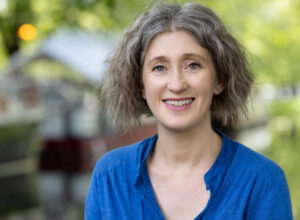On the Pleasure of Dread

by Liza Costello
My second novel Crookedwood began on some level, years ago, when I passed a signpost for a place called Crookedwood. That may sound like a bad writing joke but it’s true. The real Crookedwood is a village in the Irish midlands, but back then I’d never even passed through it. The name alone was enough to worm its way into me, with its evocation of a dark and knotted heart, until the only thing to do was write it back out.
It wasn’t the first time a piece of fiction began for me with a disquieting place. My first novel The Estate took root the day my late father and I, on an aimless midlands drive during the recession, found ourselves in an eery ghost estate, the only sound the erratic chirping of birds. But I suppose it’s no surprise that a writer of psychological thrillers should get their inspiration from unsettling places. The apple doesn’t fall far from the tree and this form’s forebear, the Gothic novel, was about nothing if not about creeping the reader out and thus summoning that delicious feeling of dread when something seems to be glimpsed in the shadows. In The Mysteries of Udolpho and in Dracula, dread-inducing medieval castles do this work, as does the psychiatric hospital in Denis Lehane’s Shutter Island, with its web of corridors leading to locked doors – something used to full effect in Scorcese’s adaptation. In My Sister: The Serial Killer, Oyinkan Braithwaite’s portrayal of the city of Lagos creates an equally oppressive and unsettling atmosphere, with its incessant traffic jams and rain. Whether penned in the nineteenth century or last year, the whole point in suspense novels is to ratchet up the ‘shivery delights and pernicious unease’ as someone once nailed the pleasure we get from such stories. As Hitchcock once said, ‘Give them pleasure. The same pleasure they have on waking from a nightmare’.
It is Radcliffe’s Udolpho that provides the epigraph to Crookedwood. ‘She listened anxiously,’ the line reads. ‘The sounds were distant, and seemed to come from a remote part of the woods.’ Sarah, the protagonist, finds herself drawn back to the woods that border the family farm for reasons she doesn’t understand. And when that leads to trouble, instead of doing the sensible thing and giving home, not to mention the woods, a wide berth for a while, she keeps returning. It’s as though on some level she knows what she doesn’t yet understand – that not only has she stumbled upon the town’s rotten core, but her actions are also serving to loosen long-buried events of her past. And the more these memories are disturbed, the less control she has over her behaviour. Even as she realises her actions threaten her very survival, she keeps going back. The mind, she is learning, has a mind of its own, greater and deeper than the thin sliver we call consciousness.
Reading a psychological thriller/Gothic novel means following a character though her actions that lead her (and therefore us) closer and closer to an inexplicable source of dread. I can’t help feeling that in doing so, we are equipping ourselves with a kind of knowledge, shadowy and flitting, one that cannot be gained outside of fiction, and that is even to be found – or maybe especially – in those stories where the danger seems to be lurking right where she’s supposed to be safest. I won’t be the first to speculate that our need for such stories is a premordial one, as intrinsic to being human as breathing. That it comes from when we actually lived in woods, among wild creatures that really did flit half-glimpsed in the shadows, and our survival depended on perceiving them before we fully registered their presence. We may now have houses and laws and rights, but dangers are always lurking somewhere out there, unpredictable or brutal or both. As Stephen King once said, ‘We make up horrors to help us cope with the real ones’.
Liza Costello is from the Irish midlands, where she and her family recently returned to live, in the same seventies bungalow in which she grew up. Her short stories and poetry have been published in places like Mslexia, The Stinging Fly, The Irish Independent and The Manchester Review. She has been shortlisted for the RTE Radio 1 Short Story Prize, among other Irish writing awards, and came joint second for the Patrick Kavanagh Poetry Award for an unpublished collection. Her first novel was originally published as an Audible Original, where it was chosen as a crime and thriller book of the month, before Hachette Ireland released the print version in 2021. Her second novel Crookedwood will be released this June.